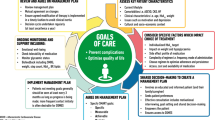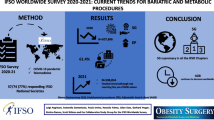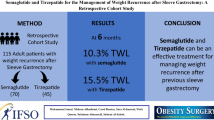Abstract
Background
Bariatric surgery results in dramatic weight loss and improves metabolic syndrome and type 2 diabetes (T2DM). However, previous studies have noted that morbidly obese patients with T2DM experience less weight loss benefits than non-diabetic patients following bariatric surgery. We sought to determine longitudinal effects of laparoscopic Roux-en-Y gastric bypass (LRYGB) on percent excess body mass index (BMI) loss (%EBMIL) and clinical metabolic syndrome parameters in patients with T2DM compared with appropriately matched cohort without T2DM.
Methods
Retrospective cohort analysis of T2DM patients (n = 126) to non-T2DM patients (n = 126) matched on age (M = 48.1 ± 9.5), sex (81 % female), race (81 % Caucasian), and pre-surgical BMI (M = 49.3 ± 9.5). Lipids, glucose, hemoglobin A1c, blood pressure, co-morbidities of obesity, medications for co-morbidities, and T2DM medications were collected at baseline, 6 months and 12 months post-surgery. %EBMIL was collected at 1, 3, 6, 9, and 12 months post-surgery. One-way analyses of variance with effect sizes estimates were conducted to compare the two groups.
Results
As expected, T2DM subjects had significantly greater pre-surgical HbA1c, blood glucose, blood pressure, and lipid parameters at baseline vs. non-T2DM (all p values of<0.05). At 1, 3, 6, 9, and 12 months after LRYRB, both groups had similar reduction in %EBMIL (p > 0.10). At 6 months, there was a significant reduction in HbA1c, blood glucose, and lipid in the T2DM cohort compared with pre-surgical levels (p < 0.0001). At 12 months, these values were not different to that of the non-T2DM subjects (p > 0.10).
Conclusions
When matched on appropriate factors associated with weight loss outcomes, severely obese patients with T2DM have similar post-LRYGB weight loss outcomes in the first 12 months following surgery compared with non-T2DM patients. Furthermore, T2DM surgical patients achieved significant improvement in metabolic syndrome components.


Similar content being viewed by others
Abbreviations
- BMI:
-
Body mass index
- FBG:
-
Fasting blood glucose
- HbA1c:
-
Hemoglobin A1c
- ICD-9:
-
International Classification of Diseases ninth revision
- LRYGB:
-
Laparoscopic Roux-en-Y gastric bypass
- LDL:
-
Low-density lipoprotein
- T2DM:
-
Type 2 diabetes mellitus
- VLDL:
-
Very-low-density lipoprotein
References
U.K. Prospective Diabetes Study Group. U.K. prospective diabetes study 16. Overview of 6 years' therapy of type II diabetes: a progressive disease. Diabetes. 1995;44:1249–58.
Cook MN, Girman CJ, Stein PP, et al. Glycemic control continues to deteriorate after sulfonylureas are added to metformin among patients with type 2 diabetes. Diabetes Care. 2005;28:995–1000.
Kahn SE, Haffner SM, Heise MA, et al. Glycemic durability of rosiglitazone, metformin, or glyburide monotherapy. N Engl J Med. 2006;355:2427–43.
Koro CE, Bowlin SJ, Bourgeois N, et al. Glycemic control from 1988 to 2000 among U.S. adults diagnosed with type 2 diabetes: a preliminary report. Diabetes Care. 2004;27:17–20.
Pi-Sunyer X, Blackburn G, Brancati FL, et al. Reduction in weight and cardiovascular disease risk factors in individuals with type 2 diabetes: one-year results of the look AHEAD trial. Diabetes Care. 2007;30:1374–83.
Nannipieri M, Mari A, Anselmino M, et al. The role of {beta}-cell function and insulin sensitivity in the remission of type 2 diabetes after gastric bypass surgery. J Clin Endocrinol Metab. 2011;96:E1372–9.
DeFronzo RA, Ferrannini E. Insulin resistance. A multifaceted syndrome responsible for NIDDM, obesity, hypertension, dyslipidemia, and atherosclerotic cardiovascular disease. Diabetes Care. 1991;14:173–94.
Galassi A, Reynolds K, He J. Metabolic syndrome and risk of cardiovascular disease: a meta-analysis. Am J Med. 2006;119:812–9.
Pories WJ, Swanson MS, MacDonald KG, et al. Who would have thought it? An operation proves to be the most effective therapy for adult-onset diabetes mellitus. Ann Surg. 1995;222:339–50. discussion 50-2.
Buchwald H, Avidor Y, Braunwald E, et al. Bariatric surgery: a systematic review and meta-analysis. JAMA. 2004;292:1724–37.
DiGiorgi M, Rosen DJ, Choi JJ, et al. Re-emergence of diabetes after gastric bypass in patients with mid- to long-term follow-up. Surg Obes Relat Dis. 2010;6:249–53.
Hall TC, Pellen MG, Sedman PC, et al. Preoperative factors predicting remission of type 2 diabetes mellitus after Roux-en-Y gastric bypass surgery for obesity. Obes Surg. 2010;20:1245–50.
Junior WS, do Amaral JL, Nonino-Borges CB. Factors related to weight loss up to 4 years after bariatric surgery. Obes Surg. 2011;21:1724–30.
Carbonell AM, Wolfe LG, Meador JG, et al. Does diabetes affect weight loss after gastric bypass? Surg Obes Relat Dis. 2008;4:441–4.
Melton GB, Steele KE, Schweitzer MA, et al. Suboptimal weight loss after gastric bypass surgery: correlation of demographics, comorbidities, and insurance status with outcomes. J Gastrointest Surg. 2008;12:250–5.
Anderson WA, Greene GW, Forse RA, et al. Weight loss and health outcomes in African Americans and whites after gastric bypass surgery. Obesity (Silver Spring). 2007;15:1455–63.
Ortega E, Morinigo R, Flores L, et al. Predictive factors of excess body weight loss 1 year after laparoscopic bariatric surgery. Surg Endosc. 2012;26:1744–50.
Schauer PR, Burguera B, Ikramuddin S, et al. Effect of laparoscopic Roux-en-Y gastric bypass on type 2 diabetes mellitus. Ann Surg. 2003;238:467–84. discussion 84–5.
Chikunguwo SM, Wolfe LG, Dodson P, et al. Analysis of factors associated with durable remission of diabetes after Roux-en-Y gastric bypass. Surg Obes Relat Dis. 2010;6:254–9.
Camastra S, Gastaldelli A, Mari A, et al. Early and longer term effects of gastric bypass surgery on tissue-specific insulin sensitivity and beta cell function in morbidly obese patients with and without type 2 diabetes. Diabetologia. 2011;54:2093–102.
White S, Brooks E, Jurikova L, et al. Long-term outcomes after gastric bypass. Obes Surg. 2005;15:155–63.
Funding
This work was supported by a grant from the Ray A. and Robert L. Kroc Summer Research Fellowship (KY). SRK receives grant support by American Diabetes Association and both SRK and PRS are supported by National Institutes of Health RO1 DK089547-01 NIDDK/NIH.
Competing Interests
SRK and PRS disclose grant support from Ethicon Endo-surgery, Inc. PRS is also on the scientific advisory board of SurgiQuest, Barosense, and Surgical Excellence; acts as consultant for C.R. Bard, Ethicon Endo-surgery, Inc., Baxter Healthcare, Stryker, Cardinal Health, and W.L. Gore and Associates, Inc.; and acts in a fiduciary capacity to the MISS Surgery Symposium, Physician Review of Surgery and RemedyMD. LJH discloses grant support from Nutrisystems, Inc. The other authors (KY and VG) have nothing to disclose.
Author information
Authors and Affiliations
Corresponding author
Rights and permissions
About this article
Cite this article
Yip, K., Heinberg, L., Giegerich, V. et al. Equivalent Weight Loss with Marked Metabolic Benefit Observed in a Matched Cohort with and Without Type 2 Diabetes 12 Months Following Gastric Bypass Surgery. OBES SURG 22, 1723–1729 (2012). https://doi.org/10.1007/s11695-012-0719-8
Published:
Issue Date:
DOI: https://doi.org/10.1007/s11695-012-0719-8




